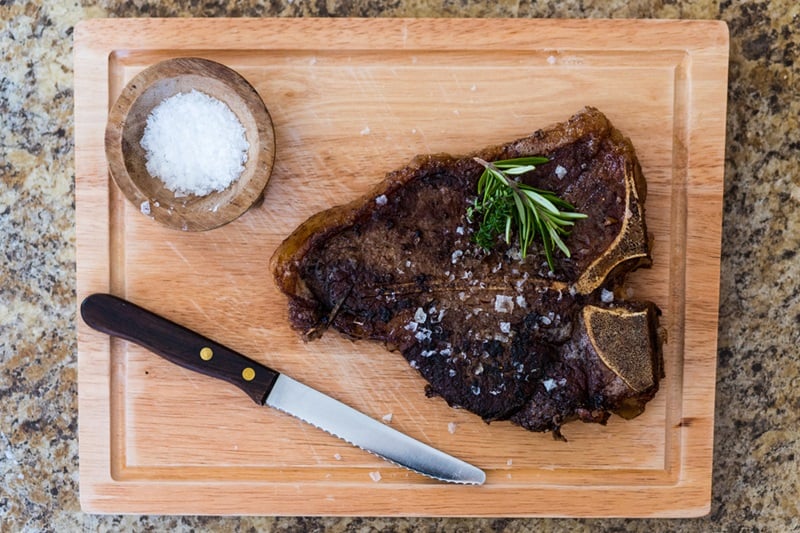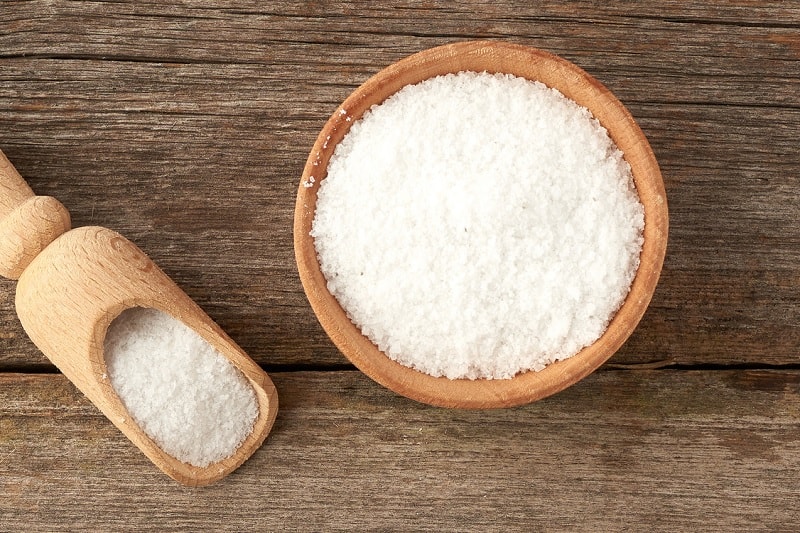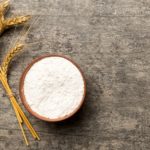Kosher salt, also sometimes known as koshering salt, is the name of an additive-free, flaky, coarsely-refined salt used in delicious recipes such as salt-encrusted prime rib, salt roasted chicken, rosemary (and other herb) salts, garlic salt, homemade pastrami, Jewish-style brisket, and a whole host more.
This specific variety is available in the UK, marketed under the name “kosher salt”, but it is also known by another name: flaked sea salt.
What Is Kosher Salt Made Of?
Kosher salt, or flaked sea salt if you’re in the UK, is made from salt, just like regular table or refined salt, and sea salt. The difference between the three is simply how big the individual grains are.
Sea salt is the bulkiest of the three. It is very coarse, with large grains.
Table or refined salt, as the name suggests, has been refined, so the individual grains are very small and fine.
Kosher salt sits in the middle of sea salt and table salt.
Is Kosher Salt Actually Kosher?
The name “kosher salt” wasn’t actually given to the salt because it was kosher, although the Jewish community does lend itself to the origin of this name.
The Jewish kashering process (also known as koshering or kashrut) requires all blood to be removed from the animal before it can be prepared for food.
The Jewish religion doesn’t permit the consumption of blood in any form, so as well as veins, arteries, and other sections of the blood system being removed, a salt-and-soak process known as dry brining is used to make sure any remaining blood is completely removed.
Kosher salt was considered to be the best salt for this process, and because it was so commonly used by the Jewish community, it was soon given the name.
Not all kosher salts are actually kosher, though.
In order to be given kosher status, also known as kosher-certified, the salt must be examined and then declared kosher by a recognised Jewish institution or rabbi.
Certificates are issued, stating that the salt has been created in a completely kosher way, from the mining process to the packaging process, following all Jewish religious laws and guidelines.
The same also applies to extra additives that are commonly added to other types of salt, like table or refined salt. Kosher-certified salt doesn’t contain additives or extras, such as iodine or anti-caking agents, making it completely suitable for a kosher diet.
If the packaging doesn’t state “kosher-certified”, the salt likely isn’t actually kosher.

What Is the UK Equivalent of Kosher Salt?
You can buy kosher salt in the UK. The term has become more popular here in recent years.
You can also find it by searching for its UK name: flaked sea salt.
If you can’t get your hands on flaked sea salt (or kosher salt), you can substitute it with both sea salt and table/refined salt, depending on the recipe and type of dish you’re trying to create. You may need to tweak how much you use, however.
Can I Use Regular Salt Instead of Kosher Salt?
Yes, you can use regular salt instead of kosher salt when cooking, and vice versa. You will need to bear something very important in mind, however: Kosher salt and regular salt aren’t the same when it comes to size of the individual grains.
Regular salt is also known as refined salt, because it has been refined. The individual grains are very small.
The individual grains of kosher salt, on the other hand, are quite large.
If you are measuring the salt by weight, you can use roughly the same amount when substituting. So, for example, if the recipe calls for 5 grams of Kosher salt, you could use 5 grams of regular or refined salt.
If you are measuring the salt by cup, however, you will need to take into account that the individual grains of Kosher salt are larger. They take up more space.
Half a cup of table or refined salt is going to contain a lot more of the grains than half a cup of Kosher salt. Because of that, you will want to tweak the amount of salt you use in the recipe, and/or switch to grams (or another weight) instead of measuring by size, such as cups. If you don’t do this, your dish is going to be really bland and in need of extra seasoning… or super-duper salty.
Is Sea Salt a Good Substitute for Kosher Salt?
Yes, sea salt is a good substitute for kosher salt, and a cheaper one!
In fact, out of table/refined salt and sea salt, sea salt is the closest to kosher salt in terms of coarseness and flakiness.
There will be a few differences when you substitute kosher salt with sea salt, though. The latter has a taste that doesn’t come with the former, and this is because extra minerals. One of these is called magnesium chloride. This is what makes sea salt taste differently to other salt types.
If you add sea salt to a recipe instead of kosher salt, you are adding the taste of sea salt, too.
Sea salt also has coarser, larger grains than kosher salt, which can alter the texture of whatever you’re cooking.
Where to Buy Kosher Salt in the UK
You can buy kosher salt from a number of different places in the UK, including supermarkets like Ocado. Online stores, like Amazon, also have a number of different kosher salt products such as Diamond Crystal Pure & Natural Kosher Salt.
You can also buy kosher-certified salt in the UK, including on Amazon and other online distributers.
Salts labelled “flaked sea salts” are probably easier to buy, readily available at places such as Waitrose, Ocado, and other online stores.

Kim is a writer with more than a decade of experience, and a food enthusiast. When she’s not spending her time writing about her favourite dishes, you can find her in the cake aisle of her local supermarket, or making a mess in the kitchen.



